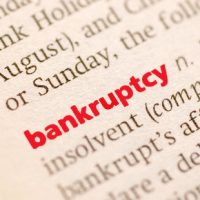Bankruptcy Glossary

For people on the precipice of bankruptcy, the thought of entering a confusing and convoluted process can be overwhelming, if not terrifying. Understanding the process and the possibilities of bankruptcy starts with a basic understanding of the terminology common to bankruptcy proceedings. A handful of the important terms worth having at least a general understanding of includes:
- Automatic Stay: An injunction that restricts bill collectors from pursuing you;
- Bankruptcy Code: Federal bankruptcy law;
- Bankruptcy Estate: Anything a debtor owns or has in interest in when a bankruptcy filing occurs;
- Chapter 7: A type of bankruptcy where nonexempt property is sold off and the process are distributed to creditors;
- Chapter 11: A type of bankruptcy where debt is reorganized, extending the payment window with an agreed upon reduced amount of debt;
- Claim: The assertion that the debtor owes the creditor payment;
- Confirmation: When a bankruptcy judge approves a bankruptcy application plan;
- Contingent Claim: A claim related to a loan on which the debtor cosigned;
- Credit Counseling: Courses related to money management that are required for debtors seeking bankruptcy;
- Creditor: Organizations to whom money is owed;
- Debtor: The person seeking bankruptcy;
- Dischargeable Debt: Debt for which a person is no longer liable.
- Executory Contract: The agreement outlining the responsibilities parties in a bankruptcy case;
- Exemptions: Property that debtors are allowed to keep despite filing for bankruptcy;
- Homestead Exemption: The protection of equity in a home for certain individuals who have lived in Florida for two years or longer;
- Joint Petition: When spouses file for bankruptcy together;
- Lien: The ability of a creditor to confiscate or hold property as security;
- Liquidation: Selling off property in order to pay off creditors;
- Means Test: A procedure for determining whether a debtor qualifies to file for bankruptcy;
- Nondischargeable Debt: Debt that will remain following bankruptcy, including those related to having previously been convicted of a DUI, child support, alimony, and some tax burdens;
- Priority Claim: Claims that are to be paid first when there is a list of claims to be paid;
- 341 Meeting: A gathering of creditors, the debtor, and a trustee, wherein the debtor is questioned under oath.
- Trustee: A representative who is appointed to oversee the case, including the bankruptcy petition itself, any liquidation proceedings, schedules, and payment dispersals to creditors.
- Unscheduled debt: Debt that was not listed on forms, but should have been.
Helping You Get it Right
The experienced Miami bankruptcy attorneys at The Law Office of Julia Kefalinos understand that you may be feeling bewildered by the process of bankruptcy. We are here to make sure you understand your options and move forward on a path that brings relief and stability. To discuss your situation, schedule a confidential consultation in our Miami office today.
Source:
uscourts.gov/educational-resources/educational-activities/bankruptcy-basics-glossary

